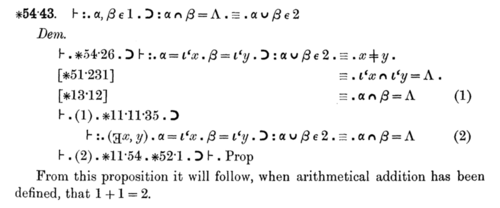 Global Information
Global InformationPrincipia Mathematica information


I can remember Bertrand Russell telling me of a horrible dream. He was in the top floor of the University Library, about A.D. 2100. A library assistant was going round the shelves carrying an enormous bucket, taking down books, glancing at them, restoring them to the shelves or dumping them into the bucket. At last he came to three large volumes which Russell could recognize as the last surviving copy of Principia Mathematica. He took down one of the volumes, turned over a few pages, seemed puzzled for a moment by the curious symbolism, closed the volume, balanced it in his hand and hesitated....
G. H. Hardy, A Mathematician's Apology (1940)[1]
He [Russell] said once, after some contact with the Chinese language, that he was horrified to find that the language of Principia Mathematica was an Indo-European one.
John Edensor Littlewood, Littlewood's Miscellany (1986)[2]
The Principia Mathematica (often abbreviated PM) is a three-volume work on the foundations of mathematics written by mathematician–philosophers Alfred North Whitehead and Bertrand Russell and published in 1910, 1912, and 1913. In 1925–1927, it appeared in a second edition with an important Introduction to the Second Edition, an Appendix A that replaced ✱9 with a new Appendix B and Appendix C. PM was conceived as a sequel to Russell's 1903 The Principles of Mathematics, but as PM states, this became an unworkable suggestion for practical and philosophical reasons: "The present work was originally intended by us to be comprised in a second volume of Principles of Mathematics... But as we advanced, it became increasingly evident that the subject is a very much larger one than we had supposed; moreover on many fundamental questions which had been left obscure and doubtful in the former work, we have now arrived at what we believe to be satisfactory solutions."
PM, according to its introduction, had three aims: (1) to analyze to the greatest possible extent the ideas and methods of mathematical logic and to minimize the number of primitive notions, axioms, and inference rules; (2) to precisely express mathematical propositions in symbolic logic using the most convenient notation that precise expression allows; (3) to solve the paradoxes that plagued logic and set theory at the turn of the 20th century, like Russell's paradox.[3]
This third aim motivated the adoption of the theory of types in PM. The theory of types adopts grammatical restrictions on formulas that rules out the unrestricted comprehension of classes, properties, and functions. The effect of this is that formulas such as would allow the comprehension of objects like the Russell set turn out to be ill-formed: they violate the grammatical restrictions of the system of PM.
PM sparked interest in symbolic logic and advanced the subject, popularizing it and demonstrating its power.[4] The Modern Library placed PM 23rd in their list of the top 100 English-language nonfiction books of the twentieth century.[5]
- ^ Hardy 2004, p. 83.
- ^ Littlewood 1986, p. 130.
- ^ Whitehead, Alfred North; Russell, Bertrand (1963). Principia Mathematica. Cambridge: Cambridge University Press. pp. 1.
- ^ Irvine, Andrew D. (1 May 2003). "Principia Mathematica (Stanford Encyclopedia of Philosophy)". Metaphysics Research Lab, CSLI, Stanford University. Retrieved 5 August 2009.
- ^ "The Modern Library's Top 100 Nonfiction Books of the Century". The New York Times Company. 30 April 1999. Retrieved 5 August 2009.